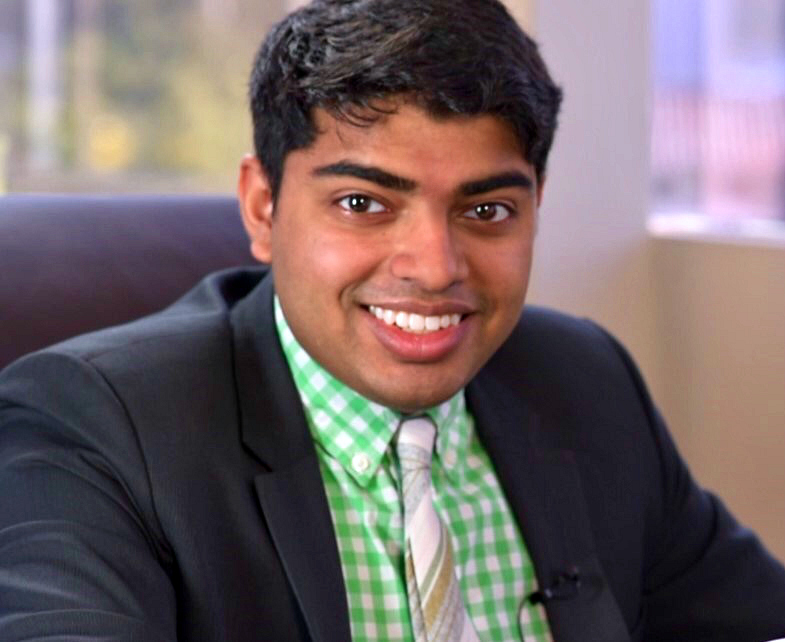MSTAR Trainee Spotlight
"Alzheimer's patients and their extremely stressed caregivers are not going to be the voting population that pushes our Congress members to fund research - that burden falls to us. The older generation will be the ones affected by the disease, but younger people are going to be the ones forced to find solutions to this tough healthcare situation," said Nihal Satyadev, a medical student at the University of Medicine and Health Sciences and founder of the Youth Movement Against Alzheimer's (YMAA). This summer Nihal ventured to the UC San Diego Center for Healthy Aging to join our Medical Student Training in Aging Research (MSTAR) Program. He was partnered with a neuropathology laboratory run by Dr. Subhojit Roy to study stem cells and dementia.
When Nihal was a teenager, his grandmother was diagnosed with Alzheimer's. By the time he was twenty-one, he had already conducted over a thousand hours of research in this field. In 2015, he realized that Alzheimer's disease is one of the largest impending healthcare crises. In order to inspire his generation to seek solutions to this problem, he founded YMAA. With 40 chapters, YMAA is now the national leader in providing opportunities for college and high school students to advocate, research, and provide care for those battling with the disease. Nihal also led a statewide campaign in California to start the first-ever "Americorps for caregiving" program, which has now been listed as state priority by the California Alzheimer's Task Force.
We spoke with Nihal about the MSTAR program and how he works with young adults to help older patients affected by Alzheimer's disease.
Can you tell us more about your MSTAR project?
This summer I was partnered with a neuropathology laboratory that is run by Dr. Subhojit Roy. The group is working on a number of projects including the validation of their CRISPR-Cas9 technology in reducing amyloid plaques in-vivo. In essence, they are looking to prove that they can cure Alzheimer's in mice using gene editing technology. My project this summer involves using a technique known as proximity ligation assay to determine whether or not two proteins, amyloid precursor protein and beta secretase, are interacting. Their interaction is a key step in the amyloid hypothesis, one of the highly cited theories for the development of Alzheimer's. If I can show that the proteins are not interacting in the mice that are treated with CRISPR-Cas9 methods, my work would serve to cement the argument that the gene editing technology is working in the same methodology as expected.
What prompted you to pursue MSTAR?
The MSTAR program was a tremendous opportunity to supplement my medical education with a summer conducting research at one of the foremost neurological institutions in the world, UC San Diego. In addition to the direct research experience, I'm grateful for the supplemental lectures on geriatrics, healthy aging, and career pipelines. The stipend doesn't hurt either!
What is the Youth Movement Against Alzheimer's?
The Youth Movement Against Alzheimer's (YMAA) is the largest youth-led Alzheimer's 501(c)(3) nonprofit in the U.S. - actively engaging over 500 students. YMAA's efforts focus on advocacy, caregiving innovation, and supporting student research. Our mission is to promote understanding of Alzheimer's among youth and young adults by providing opportunities to help those affected by the disease.
Our flagship program is a caregiver respite program, YouthCare. YouthCare is an intergenerational respite-care program that partners trained college student volunteers and older adults with early-stage dementia in a community-based setting. For 30 minutes to 1 hour, 2-3 times per week, they play games, participate in artistic activities, and deliver the research-backed Brain Boot Camp, developed by the UCLA Longevity Center to help people compensate for age-related cognitive decline.
Over the next five years, YMAA primary focuses involve: (1) scaling our social enterprise, YouthCare, which has tremendous potential to expand care access for low-income and minority family caregivers, and (2) increase the chapter network of university and high schools, which currently involves 42 schools.
To learn more about YMAA, visit http://www.theyouthmovement.org/
